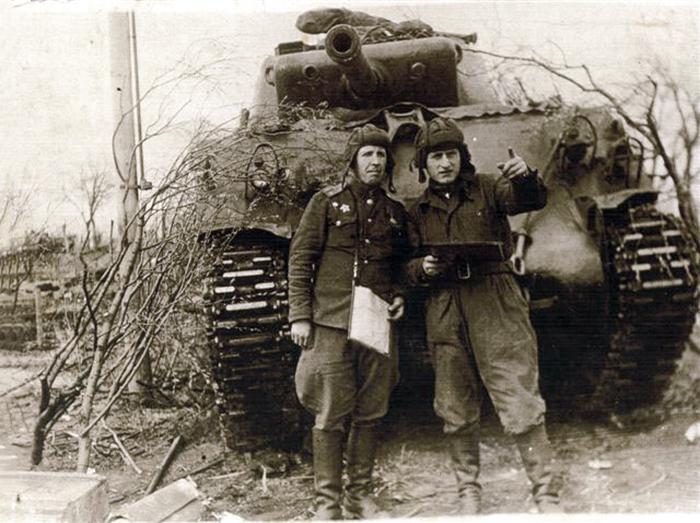Who was Chizhik, and was his story a unique one or does it represent a typical Soviet-Jewish wartime anecdote?
Isaak Chizhik was born in Ukraine in the small town of Vasilkov, not far from Kiev. In February 1919, when he was 12 years old, his mother and father were both killed in a pogrom carried out by the Ukrainian Army. In 1920, after the end of the Russian Civil War in Russia, the lonely orphan was placed in a penal colony for young criminals. After his release, he worked at a factory in Kiev until he was drafted into the Red Army in 1929; he then decided to become a professional soldier. There was logic to this decision: Since a military career had been quite impossible for Jews before the Revolution, it subsequently attracted many young Jews once the communists had paved the way for equal opportunity.
Chizhik began the war against Nazi Germany in 1941 with the rank of major, serving as an instructor at an artillery school in western Siberia. Only after repeatedly appealing to high-ranking officers did he succeed in being sent to the front in January 1942.
He took part in many battles, and although his position apparently would have allowed him to avoid direct participation in combat, he commanded an artillery unit on the front, where he was in the direct line of fire. When interviewed by the correspondent for the Soviet Yiddish newspaper Eynikayt, his answer was replete with a very human reaction – fear – and, at the same time, a clear Jewish identity.
Major Isaak Chizhik's story is one of the many interesting accounts included in the Yad Vashem's online project "Jews in the Red Army: 1941 - 1945" (conducted within The Moshe Mirilashvili Center for Research on the Holocaust in the Soviet Union at the International Institute for Holocaust Research, and supported by the Blavatnik Family Foundation).
Among the entries recorded in this project, we see that many Jewish soldiers cared about their Jewish identity and were very proud of other Jews who acted bravely. One such example was reported in the wartime diary of Vasily Grossman, a wartime correspondent for the military press and later the author of one of the best Russian-language novels of the second half of the 20th century, Life and Fate (published in English in 1985 and in Hebrew in 1986). In his diary, Grossman told the story of a Jewish captain named Kozlov, the commander of a rifle battalion in a tank brigade. This striking entry by Grossman enables us to understand much about general attitudes toward life and death at that time and those of Jews in particular.
Grossman wrote:
"He [Kozlov] is a young man with a small beard. Before the war, he studied music at the Moscow Conservatory. 'I told myself that I will be killed whatever happens, today or tomorrow. Once I realized this, it became so easy for me to live, so simple, and even somehow so clear and pure. My soul is very calm. I go into battle without any fear, because I have no expectations. I am absolutely convinced that any man commanding a motorized rifle battalion will be killed, that he cannot survive. If I didn't have this belief in the inevitability of death, I would be feeling bad and, probably, I wouldn't be able to be so happy, calm and brave during the fighting.' Kozlov told me that in his opinion Jews aren't fighting well enough. He says that they fight like ordinary people, while in a war like this Jews should be fighting like fanatics."
Jews related to awards of excellence and medals received by other Jews as official proof of their group worthiness in contributing to the war effort. This also included Jews who previously had no interest in their Jewish identity. For example, in 1942 Alexander Gitovich, a Russian-language poet who had no connection to Jewish tradition and culture, wrote a letter from the front mentioning this matter:
"When I read the lists of those given [military] honors, I always look to see whether there are any Jewish names there and I am very pleased when there are."
The increasing number of biographies analyzed in this research project suggests that Soviet Jewish soldiers were in fact more sensitive to their Jewish identity than previously assumed in public discourse.
Dr. Arkadi Zeltser is Director of the Moshe Mirilashvili Center for Research on the Holocaust in the Soviet Union of Yad Vashem's International Institute for Holocaust Research. His fields of expertise includes the Holocaust in the USSR, Soviet propaganda regarding the Holocaust and Jews during World War Two, Jewish memory on the Holocaust, Jewish-non-Jewish relations, and the participation of Jews in the NKVD. He is author of the book The Jews of the Soviet Provinces: Vitebsk and the Shtetls 1917 – 1941, which was published in Russian in Moscow in 2006, and editor of To Pour Out My Bitter Soul: Letters form the USSR 1941 – 1945, published in September 2017 by Yad Vashem.
First published in Haaretz.







